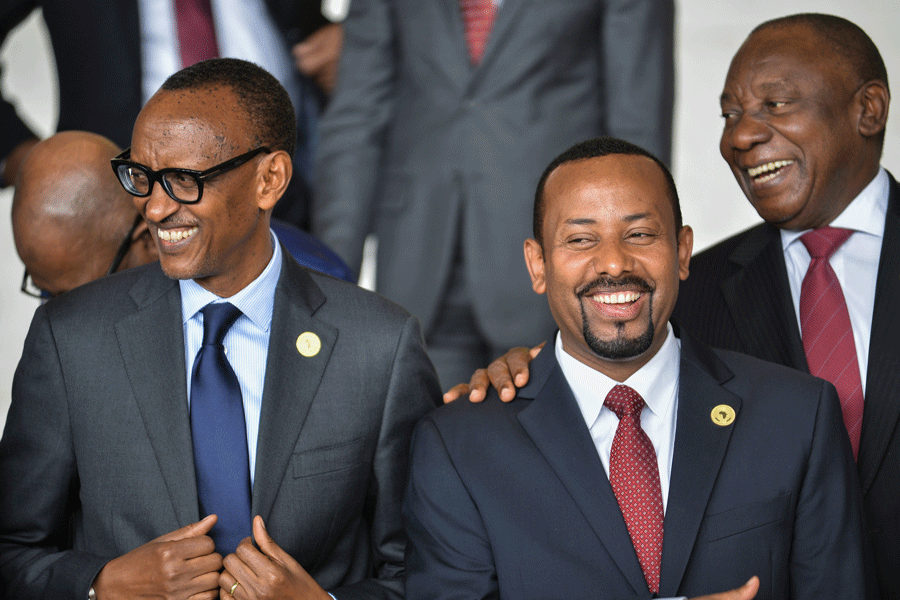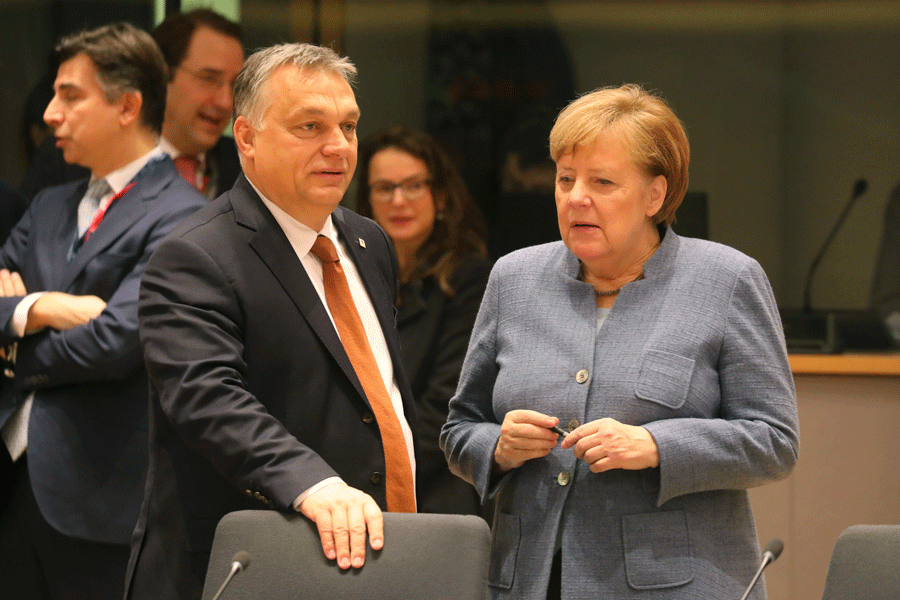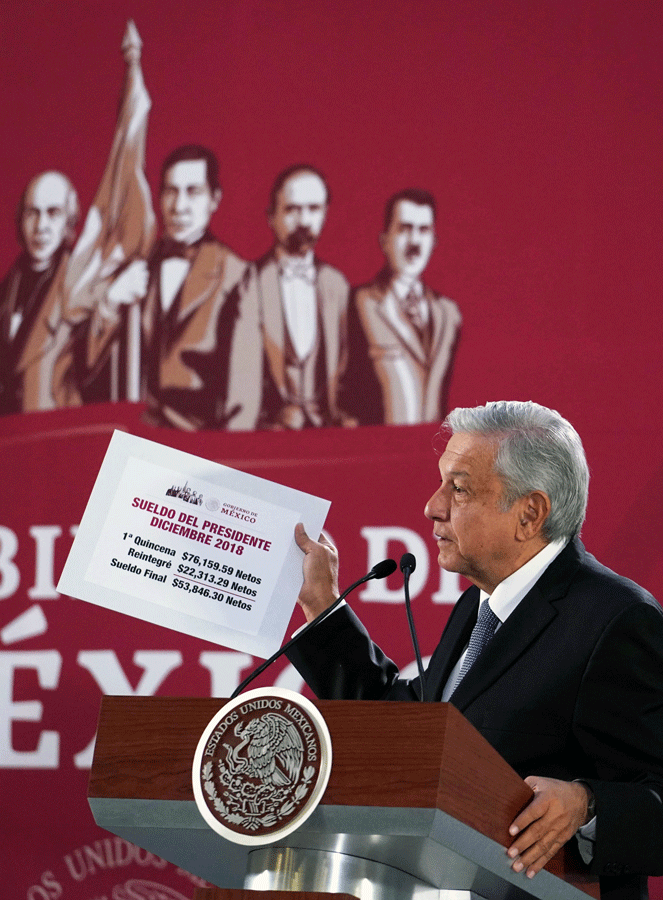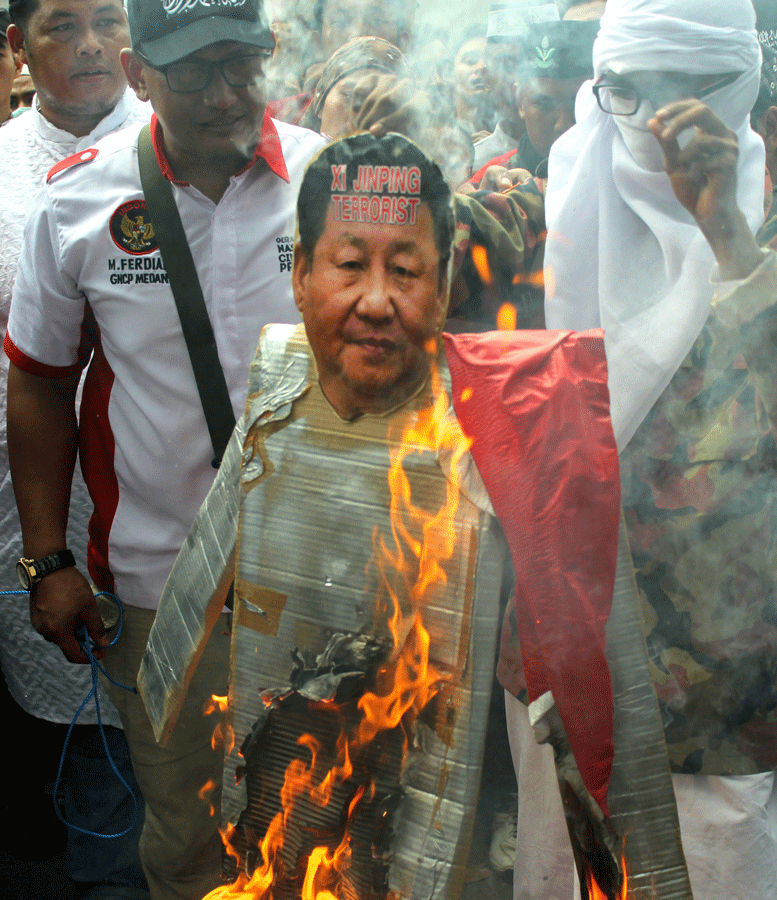A Year Like No Other
By Mahir Ali | Newsbeat International | Published 6 years ago

Hopes and prospects: Abiy Ahmed (centre) and Cyril Ramaphosa (R).
Fifty years ago last month, the three American astronauts orbiting the moon at unprecedentedly close quarters were unexpectedly rewarded with a vision no human being had glimpsed before. Beyond the horizon of the barren grey landscape beneath them, an incomplete but stunningly picturesque orb heaved into view.
Coming as it did towards the end of an internationally tumultuous year, ‘Earthrise,’ as the indelible image they snapped became known, brought home to humanity the transcendent beauty of our remarkable planet. It arguably added impetus to the quest for a better world.
That prospect is likely to have seemed considerably more realistic at the end of 1968 than it did in 2018, when even token efforts to prevent the globe from overheating, both literally and figuratively, came up against stolid resistance. Perhaps the ugliest aspect of this trend was personified by the White House incumbent, but Donald Trump is only the most prominent symptom of a malaise that has swept more or less every continent.
Inevitably, there are occasional glimmers of hope amid the gloom. In Africa, for instance, the advent of Abiy Ahmed in Ethiopia combined domestic conciliation with successful peace initiatives in the neighbourhood. In South Africa, the apparent avarice of Jacob Zuma was ultimately rewarded with his ouster and replacement by Cyril Ramaphosa. In Asia, Najib Razak, the allegedly even more corrupt prime minister of Malaysia, found himself cast out by disenchanted voters, who returned to power the surprisingly agile-minded nonagenarian, Mahathir Mohamad.
Mexican voters, meanwhile, finally rewarded the perennial candidate Andres Manuel Lopez Obrador (AMLO), with the presidency, ensconcing in power the Central American nation’s first progressive head of state in decades. Mexico, naturally, remains the favoured route for Latin American refugees hoping to make their way into the United States – a trend Trump harbours illusions of stemming with a border wall. In his campaign rhetoric, it was Mexico that was supposed to pay for the barrier, but Trump last month shut down his own government in an effort to blackmail the US Congress into funding the structure.
AMLO is reminiscent in some ways of the left-leaning Luiz Inacio Lula da Silva, who left the Brazilian presidency in 2010 with approval ratings of around 80 per cent, and was seen at the start of last year as likely to regain the post in the light of opinion polls – until he was imprisoned on possibly trumped-up corruption charges. In his stead, voters in South America’s largest nation were, unfortunately, attracted to Jair Bolsonaro, a former army officer who leans far to the right, barely attempts to cover up his misogyny or racism, and openly admires Brazil’s long and dark period of military dictatorship.
Bolsonaro, sworn in on January 1, has frequently been described as the tropical Trump, but in fact represents a far more dangerous phenomenon: an ideologue potentially unhindered by the kind of checks and balances that, to some extent, still exist in the US. In that sense he better reflects an increasingly widespread European trend, in which the far right is ensconcing itself in power, directly or otherwise, across the continent. Fascism is a relatively recent experience for Latin Americans, but in Europe it evokes comparisons with the 1930s and refreshes fading memories of the industrial-scale bloodshed that took place in the ’40s, before the Nazi scourge could be exorcised.
Even so, Adolf Hitler and Benito Mussolini’s former ally, Francisco Franco, sustained his military dictatorship in Spain until he died in 1975, and his legacy still divides his compatriots. There was consternation recently, when a far right outfit won seats in a regional Spanish parliament for the first time since Franco’s days, but in fact it was no more than a reminder that no European nation is immune to the tendency. That applies even to Germany, where manifestations of neo-Nazism have lately been normalised.
The blame is frequently placed on the shoulders of Chancellor Angela Merkel, who is said to have grievously erred in throwing open Germany’s borders to an influx of refugees, mainly from the greater Middle East, in 2015, thereby stoking the embers of latent racism. It was, in fact, a monumental humanitarian gesture, but Merkel has been unable to convince many of her compatriots of its merits, and has lately called time on her chancellorship and allowed herself to be replaced as head of the ruling Christian Democratic Union.

Winters of their discontent: Viktor Orban and Angela Merkel.
But at least open worship of Hitler is still verboten in Germany, whereas in Italy, where a far right outfit shares power with middle-of-the road anarchists, 2019 Mussolini calendars were among the paraphernalia touted as Christmas “gifts for fascist friends.” Which is hardly surprising, given that Matteo Salvini, the deputy prime minister, loves quoting Il Duce, who, it must be said, bears a closer resemblance to Trump than the more iconic Fuhrer.
Far right extremism never quite disappeared in Western Europe in the postwar years, but it generally tended to be a marginal phenomenon. A combination of factors has brought it snarling back into life, not least the trend across many of Eastern Europe’s ex-communist countries, especially Hungary, whose Viktor Orban stands out as a peculiarly odious specimen (who has lately faced a concerted popular rebellion), but also Poland and the Czech Republic. During the past year, the disease also manifested itself in Austria, and even the Scandinavian nations – once held up as exemplars of progressive social democracy – are falling prey to it.
The spectacular recent protests in France by the gilets jaunes – yellow vests – against the neoliberal administration of ex-banker Emmanuel Macron, meanwhile, serve as a useful reminder of why the European masses are revolting against their ruling elites. Basically, the stage was set by the steady erosion of social democracy in the wake of the Reagan-Thatcher ‘revolution’ and the collapse of the Soviet Union. Disparities of wealth have skyrocketed in recent decades, undeterred by the global financial crisis of 10 years ago. The impetus for Brexit can largely be traced back to the same source.
Britain’s deeply unpopular but increasingly pitied Theresa May is clueless about how to proceed amid antipathy for her Brexit formula from across the political spectrum, and the European Union (EU) is disinclined to help her out. Contingency plans are being made for the potential disaster of a no-deal Brexit, and it should become clearer by the end of March how things will go. Prospects include a second referendum or, alternatively, an early election that may just bring to office the nation’s first socialist Labour government in almost 70 years.

A change of guard: Andres Manuel Lopez Obrador at a press conference in Mexico City.
A leftward trend was also discerned in the US midterm elections in November, which rewarded the Democrats with a majority in the House of Representatives, while reducing the size of their Senate contingent. Trump, however, required no assistance in undermining his administration, as a bunch of leading aides were pushed out through the presidency’s revolving door, and foreign nations struggled with how to react to the flashing red alert from the so-called beacon of the free world. In diplomatic terms, perhaps the highlight of Trump’s year, after threatening to rain fire and fury on North Korea, was his Singapore summit with Kim Jong-un. Not much came of it eventually, and North and South Korea have sensibly pursued their own diplomacy, building bridges rather than walls.
The Middle East, meanwhile, has remained largely impervious to the winds of change, perhaps because it is already a chequerboard of tinpot dictatorships. Prospects for peace vaguely brightened towards the end of the year in a Yemen ravaged by disease and famine, battered to within an inch of its life by a Saudi-UAE coalition that obtains its weapons mainly from the US and Britain. It wasn’t so much a non-binding US Congressional resolution on halting arms sales that is likely to have spurred the brutally obdurate Saudi crown prince, Mohammed bin Salman, to marginally relent in the context of a war he launched more than three years ago and expected to win within weeks, but rather the fact that he shocked the West by arranging for the assassination and dismemberment of US-based journalist Jamal Khashoggi at the Saudi consulate in Istanbul.
But he has effectively gotten away with murder, and the conflict in Yemen is far from over. The same can be said about Syria, notwithstanding indications that Bashar al-Assad will be welcomed back into the Arab League after managing to win back much of the country’s territory, with Russian and Iranian assistance. Trump’s spur-of-the-moment decision to pull out the 2000 American troops in Syria (as well as some from Afghanistan, where violence remains endemic despite efforts towards some kind of a peace deal with the Taliban) prompted the Kurds to seek assistance from Damascus in the face of a threatened assault by Recep Tayyip Erdogan’s Turkish forces and their allies. The only international leader of note to unequivocally hail Trump’s withdrawal was Vladimir Putin – who got away with attempted murder after a botched plan by Russia’s military intelligence agency to target a former spy in Salisbury, England.

A poster of Xi Jinping being burned by Indonesian Muslim protesters in Medan.
Putin, as one would expect, hasn’t changed his stripes. But the man to watch on the international stage in the years ahead is China’s president-for-life, Xi Jinping, who, unlike Putin, ruthlessly rules an economic powerhouse. Trump’s trade war has been a setback, but he has shown no qualms about wielding the iron fist at home, as evidenced by the incarceration of an estimated million Uighurs in Xinjiang, and, tellingly, the disappearances of students who evince too much interest in Mao or Marx.
China is usually a bit more subtle than the other big powers in throwing its weight about internationally. And it’s unclear whether it was directly involved in the recent shenanigans in Sri Lanka, where the president sought to replace the constitutionally elected prime minister – a plot that was eventually thwarted. But China’s determination to exert influence and acquire assets, including military ones, is beyond doubt. Beyond that, we enter into the realm of speculation – and that is a fraught domain in these uncertain times.
As a final thought, one could do worse than cite, in the context of a trend sweeping through all too many countries today, a warning issued by Albert Einstein 90 years ago. On the cusp of the 1930s, he told an interviewer: “Nationalism is an infantile disease. It is the measles of mankind.” Back then, it took a bloodbath to provide (temporary) relief. At present, the best one can assume is that antidotes are scarce and the treatment, like Chinese planning, will inevitably be long-term.
Mahir Ali is an Australia-based journalist. He writes regularly for several Pakistani publications, including Newsline.


